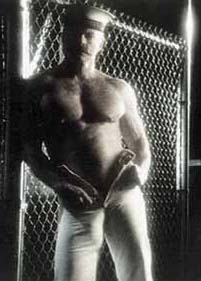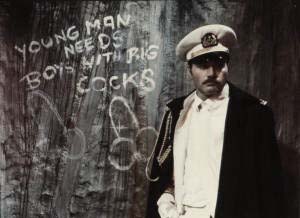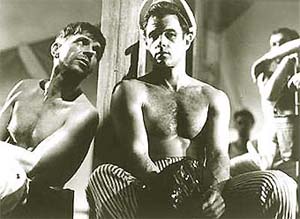
|
 You know it's a masterpiece when a character's internal deliberation between
top and bottom sexual positions reveals unuttered philosophical
implications. In Querelle, a sexual act carries with it the burden of
culture and the longings of the soul.
You know it's a masterpiece when a character's internal deliberation between
top and bottom sexual positions reveals unuttered philosophical
implications. In Querelle, a sexual act carries with it the burden of
culture and the longings of the soul.
"It's a game without weight," boasts married brothel owner Nono (Gunther Kaufmann) of his gay trysts. Rainer Werner Fassbinder proves just how weighty the stakes of gay desire really are in his final film, the 1982 Querelle. The DVD release of Querelle restores an unacknowledged cinema truth. Querelle is the Citizen Kane of Queer Cinema. In it, the radical German avant-garde filmmaker extends gay camp self-consciousness to a still-revolutionary awareness of suppressed gay desire in cinematic codes and sociopolitical reality. Too weighty? Fassbinder helps carry the burden by creating a film of overwhelming erotic force. Querelle combats pop indoctrination by distilling, heightening, and expanding pop's pleasures and pangs. Every single frame of Querelle lets loose "strange revelations." That's the phrase Lieutenant Seblon (Franco Nero) uses to describe his self-discovery as he recognizes his attraction to the sailors he commands - especially distant, narcissistic Querelle (Brad Davis). Seblon intones in his tape recorder: "My love makes me softer;" "I am glowing and melting." Querelle is a sailor and a peddler of opium. But Querelle - with Davis' movie-icon physique - is the real fix in the port city of Brest. He manipulates the desires of others to instigate a psychologically complex plot of seduction, murder, revenge, and self-destruction.
In Querelle, Fassbinder's images glow - and melt hetero movie mythology. He shoots within the labyrinthine walls, studded with penis-shaped edifices, of a highly artificial backlot set - decorated with vulgar graffiti and graphic Kama-Sutra-style etchings of sex acts. Such tactics, like the voice-over narration, the fade-to-white inter-titles, the Jean Genet epigraph, distance the spectator. Fassbinder harkens back to German Expressionist filmmaking and Brechtian Epic Theatre to bare the oppressive ideology determining narrative structures. Introducing a scene, the narrator exposes its artificiality as: "A transposition of the event in which Querelle revealed himself to us." In the ensuing sequence, Querelle murders a fellow sailor, who has disrobed. Querelle slits the sailor's throat - resulting in a fount of blood and a death kick that almost knocks over a fake tree. Querelle kisses the murdered sailor and washes the blood off his hands in a reflective pool. "It is comparable to the Visitation," the narrator intones. Fassbinder reveals Querelle's essence as objectified "monster" and fictional character. Yet: the sensuality of the sequence signifies a yearning to be cleansed, to obtain grace for both Querelle and the movie's spectator. The intellectual romance and the open eroticism of Querelle are so lush they are intoxicating. Using layers of discourse and narration, Fassbinder's narrative efficiency frees him to make softer (and harder!) his lavish inquisition on the social construction of identity - a Surrealistic strategy. The glam lighting's vivid complementary colors (blue in the foreground, red-orange in the background) and the male chorus chanting on the soundtrack keep each image pulsing. The hallucinatory soft-focus photography connotes a tactile appreciation of male forms, a very explicitly gay imagining of movie's subconscious allure. Visions of men - men and more men - posing or in stylized movement within the frame designate a world constructed out of the mystery of masculinity. "Masculinity": a myth undercut by its own covert homoeroticism and femininity, mirrored and distorted in homo codes. That is the psychic "weight" forming each suture and resonating in the portraitures in the gallery of male types (and actress Moreau) of Querelle.
 Fassbinder develops his formalism - his "perfect unity" - around the
split-consciousness caused by oppressive, homophobic ideology. He expresses
psychological mystery by casting Poschl to play both Querelle's brother and
Querelle's first love, by accenting the feminine beauty of Roger (who, we
are told, looks like his sister: "You got the same eyes. You got the same
chops"), by allowing Moreau to declare the revelatory recognition of
difference: "I'm too fat!" Querelle, himself, is torn between his humanity
and his objectification.
Fassbinder develops his formalism - his "perfect unity" - around the
split-consciousness caused by oppressive, homophobic ideology. He expresses
psychological mystery by casting Poschl to play both Querelle's brother and
Querelle's first love, by accenting the feminine beauty of Roger (who, we
are told, looks like his sister: "You got the same eyes. You got the same
chops"), by allowing Moreau to declare the revelatory recognition of
difference: "I'm too fat!" Querelle, himself, is torn between his humanity
and his objectification.
By taking a century of pop and high art advances out of the closet, Fassbinder brings a culture's repression to the light reflected back from the screen - a "painful glow." Fassbinder graciously gives Moreau the definitive words (spoken to Querelle): "You've destroyed me. You have mystical powers. They multiply infinitely." You cannot look away. |
|
 Querelle is a screen reflecting the projections not only of Seblon, but also
of Robert (Hanno Poschl), Querelle's admiring/jealous brother; Nono, a
married Black pimp who trades in sex at the roll of the dice; Lysiane
(Jeanne Moreau), Nono's aging wife and whore and Robert's lover; Gil (Poschl
again!), a tall, dark cowardly closet-case; and Roger (Laurent Malet), the
beautiful effeminate boy pining for Gil. As Lysiane sings: "Each man kills
the thing he loves." Querelle represents for each what they want to crush
and to covet.
Querelle is a screen reflecting the projections not only of Seblon, but also
of Robert (Hanno Poschl), Querelle's admiring/jealous brother; Nono, a
married Black pimp who trades in sex at the roll of the dice; Lysiane
(Jeanne Moreau), Nono's aging wife and whore and Robert's lover; Gil (Poschl
again!), a tall, dark cowardly closet-case; and Roger (Laurent Malet), the
beautiful effeminate boy pining for Gil. As Lysiane sings: "Each man kills
the thing he loves." Querelle represents for each what they want to crush
and to covet.